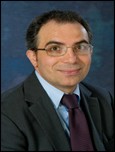The ATA supports thyroid research through the generosity of members, patients, industry, and workplace donors enabling the ATA to award thyroid research grants since 1996. ThyCa: Thyroid Cancer Survivors, Inc., a member of the ATA Alliance for Patient Education and Thyroid Head and Neck Cancer Foundation (THANC) contribute significant thyroid research grants establishing additional grants for young investigators that are awarded (in total) by expert reviewers on the ATA Research Committee. Our thanks to the members of the ATA Research Committee who have contributed their time and expertise over many years to the advancement of thyroidology
2011 ATA Research Grant Recipients
2011 ATA Grant
Elucidating the in vivo Mechanisms by Which Thyroid Hormone Regulates Energy Expenditure
Inna Astapova, PhD
Beth Israel Deaconess Medical Center (Harvard Medical School) Boston, Massachusetts
Currently at Duke University School of Medicine, Durham, North Carolina
 Dr. Astapova is a native of Moscow, Russia, and received her M.S. in Physiology from Lomonosov Moscow State University, Moscow. She conducted her graduate studies at Engelhardt Institue of Molecular Biology, Russian Academy of Sciences, and received a Ph.D. in Molecular Biology in 2002. Soon after that Dr. Astapova joined laboratory of Dr. Anthony N. Hollenberg at Beth Israel Deaconess Medical Center in Boston as a postdoctoral fellow, and, recently, Instructor in Medicine, to study the role of nuclear corepressors NCoR and SMRT in the transcriptional repression by thyroid hormone receptor. Her research interests include not only the molecular basis of thyroid hormone action, but also the role of thyroid hormone in the regulation of metabolism and energy homeostasis, and potential use of thyroid hormone and its analogs for treatment of obesity and metabolic disease. Press Release
Dr. Astapova is a native of Moscow, Russia, and received her M.S. in Physiology from Lomonosov Moscow State University, Moscow. She conducted her graduate studies at Engelhardt Institue of Molecular Biology, Russian Academy of Sciences, and received a Ph.D. in Molecular Biology in 2002. Soon after that Dr. Astapova joined laboratory of Dr. Anthony N. Hollenberg at Beth Israel Deaconess Medical Center in Boston as a postdoctoral fellow, and, recently, Instructor in Medicine, to study the role of nuclear corepressors NCoR and SMRT in the transcriptional repression by thyroid hormone receptor. Her research interests include not only the molecular basis of thyroid hormone action, but also the role of thyroid hormone in the regulation of metabolism and energy homeostasis, and potential use of thyroid hormone and its analogs for treatment of obesity and metabolic disease. Press Release
2011 ATA Grant
Role of interferon alpha in development of AITD: Epigenetic regulation of key genes
Mihaela Stefan, PhD
Mount Sinai School of Medicine New York, New York
 Dr. Mihaela Stefan completed her undergraduate studies at University of Bucharest, Romania (1990 -1995). She obtained the doctoral degree in Genetics from the same institution in 2000. As a graduate student she was the recipient of several fellowships that allowed her to work in a well-known human genetics laboratory at Tor Vergata University in Italy. She spent her post-doctoral training at University of Pennsylvania (2001 – 2005). In 2005 she was appointed as Research Assistant Professor at University of Pittsburgh were she worked until 2009 when she was appointed as Assistant Professor at Mount Sinai School of Medicine in New York. Her current interests focus on the genetic and epigenetic mechanisms and genes underlying the clinical phenotype in thyroiditis. She has received honors and awards for the following; 2002 Postdoctoral Translational Award Winner from the American Society of Human Genetics, the American Heart Association Postdoctoral Fellowship Award (2003-2005) and the 2004 Postdoctoral Translational Award Finalist from the American Society of Human Genetics. Press Release
Dr. Mihaela Stefan completed her undergraduate studies at University of Bucharest, Romania (1990 -1995). She obtained the doctoral degree in Genetics from the same institution in 2000. As a graduate student she was the recipient of several fellowships that allowed her to work in a well-known human genetics laboratory at Tor Vergata University in Italy. She spent her post-doctoral training at University of Pennsylvania (2001 – 2005). In 2005 she was appointed as Research Assistant Professor at University of Pittsburgh were she worked until 2009 when she was appointed as Assistant Professor at Mount Sinai School of Medicine in New York. Her current interests focus on the genetic and epigenetic mechanisms and genes underlying the clinical phenotype in thyroiditis. She has received honors and awards for the following; 2002 Postdoctoral Translational Award Winner from the American Society of Human Genetics, the American Heart Association Postdoctoral Fellowship Award (2003-2005) and the 2004 Postdoctoral Translational Award Finalist from the American Society of Human Genetics. Press Release
2011 ThyCa ATA Grant – Thyroid Cancer
A PI3K based phophoproteome signature to predict prognosis and response to therapy in BRAF mutant papillary thyroid carcinoma
Naifa Busaidy, MD
University of Texas MD Anderson Cancer Center Houston, Texas
 Dr. Busaidy is an Associate Professor in the Department of Endocrine Neoplasia & Hormonal Disorders at the University of Texas – M.D. Anderson Cancer Center (UTMDACC). She received her medical degree from Baylor College of Medicine and completed her clinical and research training at MD Anderson. Her clinical and research interests encompass investigating molecular signatures in metastatic noniodine avid papillary thyroid carcinomas with the hope to improve the treatment options and care of the patients with this disease. Dr. Busaidy is a principal & co-investigator on several NCI and industry sponsored clinical trials aimed at improving patient outcomes with progressive metastatic thyroid cancer. She was selected to be on the NCI’s task force for revision of the Common Toxicity Criteria for Adverse Events, version 4. She also was invited to serve on a subcommittee of the NCI’s Investigational Drug Steering Committe, tasked with evaluating the metabolic toxicities of the PI3K/mTOR/aKT inhibitors. These many rich collaborative environments afford her a unique and comprehensive understanding of the potential and adverse effects of these targeted agents. Press Release
Dr. Busaidy is an Associate Professor in the Department of Endocrine Neoplasia & Hormonal Disorders at the University of Texas – M.D. Anderson Cancer Center (UTMDACC). She received her medical degree from Baylor College of Medicine and completed her clinical and research training at MD Anderson. Her clinical and research interests encompass investigating molecular signatures in metastatic noniodine avid papillary thyroid carcinomas with the hope to improve the treatment options and care of the patients with this disease. Dr. Busaidy is a principal & co-investigator on several NCI and industry sponsored clinical trials aimed at improving patient outcomes with progressive metastatic thyroid cancer. She was selected to be on the NCI’s task force for revision of the Common Toxicity Criteria for Adverse Events, version 4. She also was invited to serve on a subcommittee of the NCI’s Investigational Drug Steering Committe, tasked with evaluating the metabolic toxicities of the PI3K/mTOR/aKT inhibitors. These many rich collaborative environments afford her a unique and comprehensive understanding of the potential and adverse effects of these targeted agents. Press Release
2011 ThyCa ATA Grant – Medullary Thyroid Cancer
The Role of the Translocator Protein (TSPO) in the Thyroid Cancer Response to the Treatment
Joanna Klubo-Gwiezdzinska, PhD
Washington Hospital Center/Georgetown University Washington, DC
Currently at National Institutes of Health, Bethesda, Maryland
 Joanna Klubo-Gwiezdzinska, MD, PhD, MHSc holds the faculty appointment at the National Institutes of Health, National Institute of Diabetes and Digestive and Kidney Disease. She received her medical degree and clinical training in internal medicine from Nicolaus Copernicus University Collegium Medicum in Bydgoszcz, Poland. She completed her internal medicine training at Georgetown University/Washington Hospital Center, Washington DC and endocrine fellowship at the National Institutes of Health, Bethesda, MD. She also holds a Master’s Degree in Clinical Research from Duke University, Durham, NC. Dr Klubo-Gwiezdzinska is currently serving as a Chief of the Thyroid Nodules, Cancer and Functional Thyroid Disorders Section at the National Institutes of Health. Her research involves translational and clinical studies focused on the optimization of thyroid nodules and thyroid cancer diagnosis, as well as appropriate risk stratification and therapy aimed at improving patients’ morbidity and mortality. Her team is working on the cross-talk between signaling pathways and cancer metabolism. Dr Klubo-Gwiezdzinska’s lab found that mitochondrial glycerophosphate dehydrogenase (mGPDH) is one of the targets of an anti-diabetic drug – metformin in thyroid cancer. Her team continues to investigate a molecular and metabolic signature of thyroid cancer, which could be targeted by agents affecting cancer metabolism. Dr Klubo-Gwiezdzinska is a recipient of several awards to include Endocrine Society’s International Endocrine Scholars Award for Outstanding Achievements in Endocrinology, Endocrine Fellows Foundation Grant, Endocrine Society’s Thyroid Clinical Research Fellowship & Mentor Award and Lasker Clinical Research Tenure Track Scholarship from the National Institutes of Health. Press Release
Joanna Klubo-Gwiezdzinska, MD, PhD, MHSc holds the faculty appointment at the National Institutes of Health, National Institute of Diabetes and Digestive and Kidney Disease. She received her medical degree and clinical training in internal medicine from Nicolaus Copernicus University Collegium Medicum in Bydgoszcz, Poland. She completed her internal medicine training at Georgetown University/Washington Hospital Center, Washington DC and endocrine fellowship at the National Institutes of Health, Bethesda, MD. She also holds a Master’s Degree in Clinical Research from Duke University, Durham, NC. Dr Klubo-Gwiezdzinska is currently serving as a Chief of the Thyroid Nodules, Cancer and Functional Thyroid Disorders Section at the National Institutes of Health. Her research involves translational and clinical studies focused on the optimization of thyroid nodules and thyroid cancer diagnosis, as well as appropriate risk stratification and therapy aimed at improving patients’ morbidity and mortality. Her team is working on the cross-talk between signaling pathways and cancer metabolism. Dr Klubo-Gwiezdzinska’s lab found that mitochondrial glycerophosphate dehydrogenase (mGPDH) is one of the targets of an anti-diabetic drug – metformin in thyroid cancer. Her team continues to investigate a molecular and metabolic signature of thyroid cancer, which could be targeted by agents affecting cancer metabolism. Dr Klubo-Gwiezdzinska is a recipient of several awards to include Endocrine Society’s International Endocrine Scholars Award for Outstanding Achievements in Endocrinology, Endocrine Fellows Foundation Grant, Endocrine Society’s Thyroid Clinical Research Fellowship & Mentor Award and Lasker Clinical Research Tenure Track Scholarship from the National Institutes of Health. Press Release
2011 ThyCa ATA Grant – Thyroid Cancer
Targeting BRAFV600E with an orally available selective inhibitor in novel in vitro and in vivo preclinical models of human papillary thyroid cancer
Carmelo Nucera, MD, PhD
Beth Israel Deaconess Medical Center (Harvard Medical School) Boston, Massachusetts

2011 Second Year Grant Awardees
Jens Mittag, PhD – Karolinska Institutet, Stockholm, Sweden
Mayrin Correa-Medina, PhD – University of Miami, Miami, Florida
Tania Pilli, MD, PhD – University of Illinois at Chicago, Chicago, Illinois – ThyCa
Rozita Bagheri-Yarmand, PhD – University of Texas M D Anderson Cancer Center, Houston, Texas – ThyCa Medullary Thyroid Cancer
Wen T. Shen, MD, University of California, San Francisco, California – THANC


